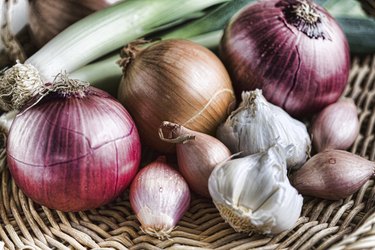
Shallots have a distinctive taste that might best be described as a garlic-onion hybrid, although this bulb isn't a genetic mix of the two. Shallots have an onion-like flavor with a bite that approximates garlic's, but with a sweeter and milder taste. Shallots readily take onion's place as an aromatic in just about any preparation. The results are a more tempered taste and -- because shallots have a finer texture -- less prominent chunks in the finished product, a particularly appealing quality in delicate or subtle dishes.
Step 1
Use three shallots per small onion or 1/3 cup of chopped onion. Five to six shallots replace a medium onion, while you'll need seven or eight to stand in for a large onion. Cooking, unlike baking, doesn't require precise measurements, so you may tailor aromatic quantities to taste.
Video of the Day
Step 2
Use a bit more shallot than you would onion for a distinct flavor. Because of its milder taste, the flavor added by shallot is more subtle than the flavor added by an equal amount of onion.
Step 3
Withhold most or all of the garlic in a recipe when substituting shallot for onion. Shallot offers a similar bite, so using it and garlic together easily creates too potent a garlicky flavor in a dish.
Tip
Red onions are typically the most mild, and yellow onions also are typically fairly mild and slightly sweet; recipes calling for these types are best suited to shallot substitutions. White onions are the most pungent, so shallots are not usually a good substitute for them.
Select firm shallots that don't have bruises, discoloration, soft or mushy spots, mold or sprouts.
Video of the Day